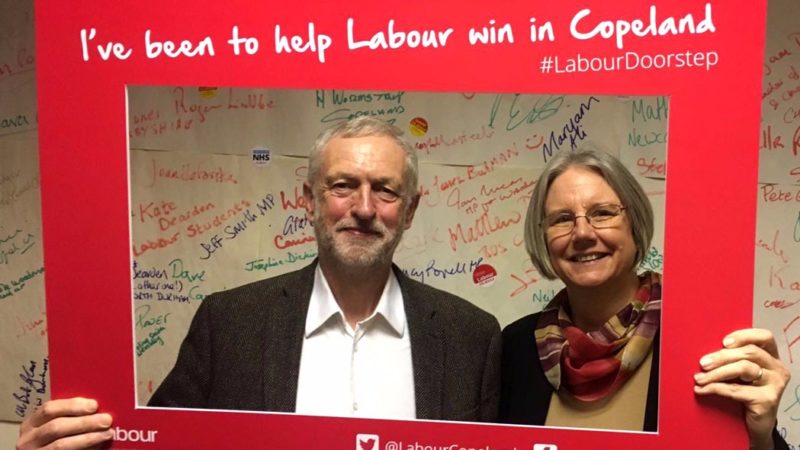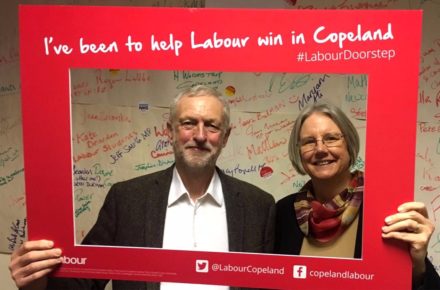

It was fascinating to read the litany of excuses for the Copeland by-election defeat put forward by Momentum’s national organiser Emma Rees on Sunday on this site.
Everyone, and everything, it seems is to blame except Momentum and its own approach and strategy.
How long will Momentum have to be in the driving seat in the Labour party before they start to accept responsibility for the party’s electoral plight?
Rees says “Labour’s defeat in Copeland demands a period of serious reflection” but then doesn’t offer any serious reflection in her article.
She says “Labour’s decline long pre-dates Corbyn’s leadership.” This is true nationally but it has accelerated exponentially under Jeremy Corbyn’s leadership. In fact in Copeland, where she falsely claims “Labour has been haemorrhaging votes in election after election in Copeland since 1997”, Labour’s majority went up in 1987, 1992 and 1997 under Tony Blair, went down in 2001, then went back up in Blair’s third election in 2005. Whilst the majority slipped, in 2010 Jamie Reed increased Labour’s vote by over 2,600 to its highest level since the 1997 landslide, despite an extremely adverse boundary change. This was a seat where the Labour vote was remarkably stable at between 16,750 and 19,699 in every General Election between 2001 and 2015, then fell off a cliff to 11,601, a third of it going AWOL, last Thursday.
Rees talks about a “tradition of neglect of communities like Copeland and Stoke”. That is also false and fuels UKIP and Tory propaganda to suggest Labour in power neglected such communities. Both constituencies boast impressive new schools and hospitals built when Labour was in power. Both saw massive flows of public spending through their local authorities under Labour. Copeland benefitted economically from years of Labour investment in the nuclear industry. Her reference to “decades of under-investment, at the hands of both the Conservatives and New Labour” is a wrong when it comes to the 1997-2010 Labour Governments, when public spending and infrastructure investment were at record levels, and heavily targeted at precisely the kind of communities like Copeland and Stoke.
Referring to nuclear, Rees says “fear for jobs was always going to win out” but doesn’t explain that the only reason that fear existed was because Rees’ pick as Labour leader is a guy who has spent a lifetime wanting to abolish nuclear power, the main local employer.
Rees talks about people being “desperate for a real alternative to the Tories” but doesn’t explain how we therefore lost to those Tories, in a seat we already held and had done since 1935, whereas we consistently won it under previous leaders she presumably implies were less of an “alternative” than the current one.
She talks about Momentum’s new organising techniques. Indeed it was very welcome that Momentum, along with every other strand of opinion in the party, mobilised for these by-elections. But if the politics promoted by Momentum are turning off voters by the million, “85 carloads of Momentum activists” going to Copeland is just increasing the party’s ability to record whose votes it has lost, and their sectarian antics inside CLPs are draining and debilitating effort that should be spent on external battles with the Tories rather than organising for who gets to be branch vice-chair.
Some of what she says just seems incoherent. “Mobilising digitally helped to get hundreds of activists out in Stoke and Copeland over the past three weeks. Momentum has 20,000 members, the potential of an army of activists that Labour could deploy if they used similar campaigning techniques is overwhelming.” This implies Labour doesn’t use digital means to mobilise campaigners. It does. The guy in charge of Labour’s digital campaigning is Ben Soffa, who ran the digital side of Corbyn’s leadership campaign that led to the creation of Momentum. I am left confused about whether the 85 carloads of Momentum activists (let’s assume that’s 340 people at 4 a car) that were mobilised out of 20,000 Momentum members is supposed to be a triumph, showing how much better Momentum are at sending emails than Labour, or a failure.
She says “Rather than swooping in to sell Labour’s message just before an election, we need to be supporting and empowering people to organise locally from the ground-up, with policies and campaigns coming from communities themselves rather than these being introduced from the top-down.” I can show her hundreds of CLPs where people who are nothing to do with Momentum have been campaigning locally in the way she describes all year round for years. What does she think Labour in local government does if it isn’t develop great local policies in our towns and cities? Momentum’s main contribution seems to be to try to purge from running CLPs the very people who do organise that local campaigning, and deselect the councillors who have so successfully led Labour in local government. And if policy is to be developed locally, Corbyn should have listened to Copeland people’s views on nuclear power decades ago, not tried to impose his London prejudices on them.
The primary determinants of voting behaviour in England (Scotland is a different matter because of the independence question), once you get beyond the diminishing blocks of voters who are loyal to a party for inherited family or class reasons, are:
- The personality and politics of the party leaders and their perceived competence
- The perceived economic competence of the parties
- Their wider policy positions on the issues which most resonate with the public (the most recent Mori issues index shows the public are most concerned about Brexit, immigration, and the NHS, in that order)
In a small number of constituencies vital local economic or infrastructure interests also affect voting behaviour. Copeland is one of these because it is so economically dominated by the nuclear power industry.
How Labour is perceived on all these things is in the control of the leadership of the party, particularly now that all the key shadow cabinet positions are in the hands of close political or personal supporters of Corbyn.
People allied with and supported by Momentum had control of how the party was perceived in Copeland on all these issues. They picked the leader in full knowledge of his skills, personality and experience of high office, and all his policy baggage, including on the nuclear issue. They picked the overall direction, strategy and positioning of the party. They picked the economic message and hold the post of shadow chancellor. They picked the policy on Brexit. They picked the policy on immigration and hold the post of shadow home secretary.
They earned the right in two leadership elections to take the party in the direction they have always dreamed of, sharply to the left.
They didn’t earn the right to deny all responsibility when that direction, as basic logic, maths, and rudimentary understanding of the British public and of British political history told everyone in would, turned out to be electorally disastrous.
Leadership entails accepting responsibility for failure and for turning it round. That applies not just to one person at the top but to the people that put them there.
You created this situation. Now deal with it.




More from LabourList
‘I was wrong on the doorstep in Gorton and Denton. I, and all of us, need to listen properly’
‘Why solidarity with Ukraine still matters’
‘Ukraine is Europe’s frontier – and Labour must stay resolute in its defence’